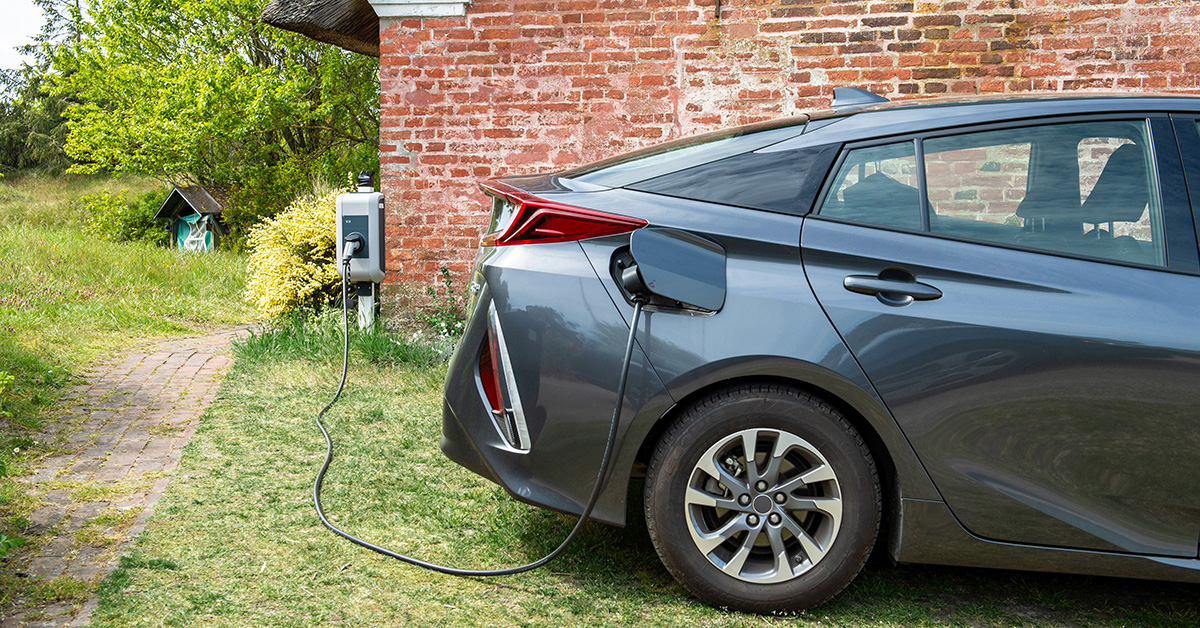Blog
How Do You Charge an Electric Vehicle at Home?

Drivers in Maine and around the world are making the switch to electric vehicles. Electric vehicles, or EVs, are fun to drive, cheaper to operate, and cleaner for the environment. In the next 10 years, it is predicted that one in every six cars on the road in Maine will be an EV. Efficiency Maine offers rebates to make the switch to an electric vehicle even easier. If you’re interested in buying an EV, we’d like to share some useful information about owning and driving them. Over the next few weeks, we’ll cover a variety of EV topics that we hope will help Mainers across the state feel confident and excited about switching to an EV. Today’s topic: How do you charge an electric vehicle at home?
Going the Distance
Many EV drivers enjoy the convenience of charging at home. In fact, most EV drivers do more than 80% of their charging at home.* For most Mainers, an EV’s range is more than enough to cover their routine travel needs. The average round-trip commute to work for Mainers is 24 miles, and 50% of Mainers commute less than 10 miles a day.** Since most new EVs have a range of 200 to 300 miles, drivers can typically go several days before needing to recharge.
Types of Home Chargers
There are two types of home EV chargers: Level 1 chargers and Level 2 chargers. Level 1 chargers are typically included with the purchase of a new EV and do not usually require electrical upgrades to your home. One end of the charger plugs into any standard 120 volt (V) outlet and the other end plugs directly into the car. If your house or business is already equipped with a conveniently located 120V outlet, you can begin to use your Level 1 charger immediately. Level 1 chargers are the least expensive and also the slowest way to charge your EV; taking more than 12 hours to charge an EV with a 60 kWh battery from empty to full. ***
If you routinely drive long distances, you may want to consider a Level 2 charger, which will charge your car faster. Level 2 chargers may be sold separately from the car and plug into a 240V outlet.**** The Level 2 charger connector, called a universal SAE J1772 connector, is compatible with all EVs in the North American market.***** If you have an all-electric car, a Level 2 charger allows you to charge five to seven times faster compared to a Level 1 charger.****** A Level 2 charger takes about eight hours to fully charge a car with a 60 kWh battery, allowing you to get on your way sooner.
Level 2 chargers typically cost between $500 and $900, depending on the equipment type. Most homes will require some degree of an electrical upgrade in order to install a Level 2 charger. The cost of installation depends on the quality of the hardware, type of house, and the complexity of the electrical work needed to service your charger. Higher costs for home charging installations generally correspond to the number of wall and floor penetrations, total circuit distance, or service upgrades. Click here to watch a video with tips on how to install a home EV charger.
Overall, charging an electric vehicle at home is an easy, inexpensive, and efficient way to maintain your EV’s range. For more information about how to select and install a home EV charger, see Efficiency Maine’s EV home charger guidebook.
Efficiency Maine offers instant rebates for eligible BEVs and PHEVs at participating Maine car dealers. Eligible vehicles direct from a manufacturer are eligible for mail-in rebates. For a detailed list of vehicles that qualify for Efficiency Maine rebates, visit www.efficiencymaine.com/docs/EV_Rebate_Eligible_Vehicles.pdf. To find a participating dealer near you, visit www.efficiencymaine.com/docs/EV_Accelerator_Participating_Dealers-3.pdf. Also check www.efficiencymaine.com/ev/ for our EV video library and other resources.
*According to the US Department of Energy’s Office of Energy Efficiency and Renewable Energy
** Source: https://onthemap.ces.census.gov/, U.S. Census Bureau
*** Source: Clipper Creek clippercreek.com/charging-times-chart
**** Or may be hardwired to a 240V line
***** Tesla chargers and cars have a modified version of the SAE J1772 connector. Every Tesla car comes with a SAE J1772-to-
Tesla adaptor, enabling the driver to charge at most Level 2 charging stations.
****** If you have a plug-in hybrid, recharging with a Level 2 charger is about three times faster than it is with a Level 1
To subscribe to Efficiency Maine’s blog page, please click here.
